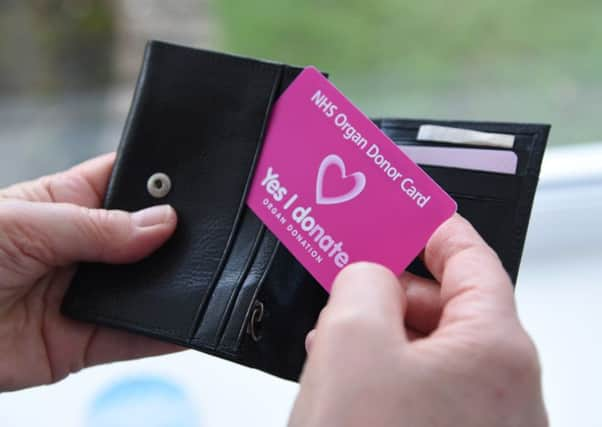Dr Sue Robertson: Opt out is the way ahead for organ donation


In February, the Scottish Government pledged to begin a consultation on increasing donation rates, including consideration of an opt-out system of organ donation. The BMA believes there is still more that can be done to improve organ donation rates and I would urge Aileen Campbell, the Public Health Minister, to start work on this consultation now. All the time we waste means that more lives will be lost.
In Scotland, more than 500 people are on the transplant waiting list; some will die waiting. Meanwhile, repeated studies show up to 90 per cent of the population supports organ donation, yet only around half have signed up to the organ donor register.
Advertisement
Hide AdAdvertisement
Hide AdWe believe that genuine choice over organ donation can be facilitated through a soft opt-out system whereby adults – who have been well informed of the options – can choose to opt out of organ donation during their lifetime, rather than having to opt into donation, as is the status quo. A culture in which donation is discussed more openly and perceived as the norm would fit better with what most people say they would like to happen. Rigorous safeguards are imperative to such a system, in order to ensure genuine choice is protected.
This is how a soft opt-out system could work:
n Before the new system is introduced there would be extensive and high-profile publicity to ensure all members of society were aware of the forthcoming change and to encourage them to consider their own wishes about donation after their death. This campaign would be repeated regularly once the system has been introduced.
n A database would be established with mechanisms for people to easily and quickly opt out.
n When someone over the age of 16 dies and donation is a possibility, the opt-out register must, by law, be checked and if the individual had opted out, donation could not proceed.
n As an extra safeguard, if the individual had not opted out, family would be asked if they were aware of any unregistered objection.
n If the relatives were not aware of any objection, they would be informed that donation would proceed. There would, though, be scope not to proceed if it became evident that to do so would cause severe distress to relatives.
Under an opt-out system individuals have exactly the same choice as under an opt-in system; to donate or not to donate, but the default position changes. Unless an individual objects to donation their organs can be used after death to benefit others. We support the principle that everyone has, and would retain, the right to refuse to donate their organs after death and to have that wish respected. We believe opt-out would enhance individual choice – by making it more likely that the majority of the population who say, when asked in surveys, that they would wish to donate will have their wishes fulfilled.
lDr Sue Robertson is a member of the BMA’s Scottish Council and works as a kidney specialist at the Renal Unit of Dumfries and Galloway Royal Infirmary